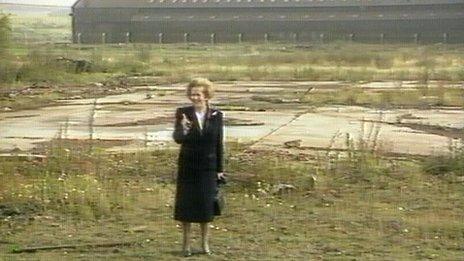Margaret Thatcher and her impact on north-east England
- Published
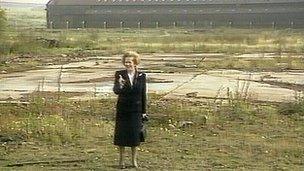
Margaret Thatcher took her "walk in the wilderness" in Stockton in 1987
There's been much debate about Margaret Thatcher's political legacy in the days since her death.
I have little doubt she is the most significant UK politician of my lifetime.
And she has certainly never been forgotten in the north-east of England where I ply my trade.
So when I first began compiling the elements of her obituary, it wasn't hard to find people with strong opinions.
Miners' strike
When I came to look at our archive pictures, I was also struck by how much of what's become legendary about the Thatcher years played out in the region.
Of course, there was the miners' strike - though the North East was just one of the battlegrounds in that dispute.
There were also other major industrial closures and job losses in the shipyards and steel industry.
But there was also the "walk in the wilderness" in Teesside. To her detractors this was her revelling in the industrial wasteland produced by her policies.
To her it was a symbol of necessary change - clearing the way for a brighter future.
There was also the footage where she described critics as "moaning minnies" while on a visit to the North East in 1985.
In fact there was an astonishing edge to almost every encounter I saw her have here.
It's hard to see the same footage ever being produced in these days of media management and focus groups.
Brand of Conservatism
Of course, there are plenty of people in the North East who detest Margaret Thatcher to this day. There are many anecdotes about people having champagne on ice in anticipation of her death.
But a study of the politics of the day actually suggests far more people voted for her brand of Conservatism than for David Cameron's.
In 1983, her party took 34% of North East votes. In 2010, David Cameron won less than 24%.
After the 1983 election the party had MPs in Darlington, Stockton, Langbaurgh, Tynemouth and even in Newcastle. Now they have just two in the region, and they don't have a single councillor in Newcastle.
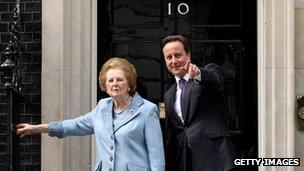
Margaret Thatcher won many more votes in the North East than David Cameron
It's possible that the folk memory of Thatcherism has left Conservatism as a toxic brand in the North East - but if it did, it only really took root after its architect had left office.
And perhaps local Conservatives still have something to thank her for. The wilderness she walked through in 1987 is now a business park in Stockton South - the only North East seat the Conservatives gained in 2010.
Conflicted legacy
But if you really want an example of Mrs Thatcher's conflicted legacy, I'd point to two women who I spoke to for her obituary.
Both of them entered politics because of Margaret Thatcher, but for very different reasons.
Juliana Heron's husband Bob was a miner at Hetton pit in County Durham when the 1984 strike began.
At the time she had little interest in politics. But the strike radicalised her. She became one of the band of miners' wives sucked into the dispute. The strike was lost, and the pit closed.
She said: "Our group of miners' wives was in the House of Commons when she called us the enemy within and that'll stay with me forever.
"I'm not a hateful person but I despise what she did to our area.
"People will go through history and they'll wonder what happened to Hetton. Basically Margaret Thatcher happened to Hetton - she closed the pit and closed the area."
Juliana has since become a Labour councillor in Sunderland, even becoming the city's mayor in 2003, and admits that she only entered politics because of the impact of Margaret Thatcher.
Political awakening
And the same can be said of Anne-Marie Trevelyan. She stood for the Conservatives in Berwick at the 2010 General Election, and will contest the seat again in 2015.
She vividly remembers her political awakening beginning when she saw Margaret Thatcher on the news as a child.
She said: "I was watching what was the winter of discontent, and then Margaret Thatcher came on. I was only 10 but what she said made sense to me.
"That sparked something in me which has never gone away, and I'm putting myself forward for election. It built a belief in me that if you don't agree with something you should stand up and fight for it. She was my first clear example of that being possible."
As we approach Baroness Thatcher's funeral, people will continue to clash about her legacy. While some watch the procession from London on television, some ex-miners in Easington in County Durham will be holding a party.
She will not be forgotten any time soon in the region where she had such an impact.
When I began my journalistic career in 1992 she was no longer Prime Minister, but she hasn't stopped being part of political debate in the last two decades, and I expect her name to continue to generate strong emotions and opinions well past my retirement.
- Published10 April 2013
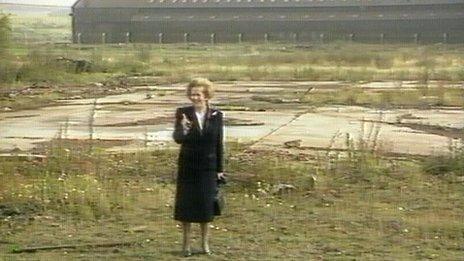
- Published8 April 2013
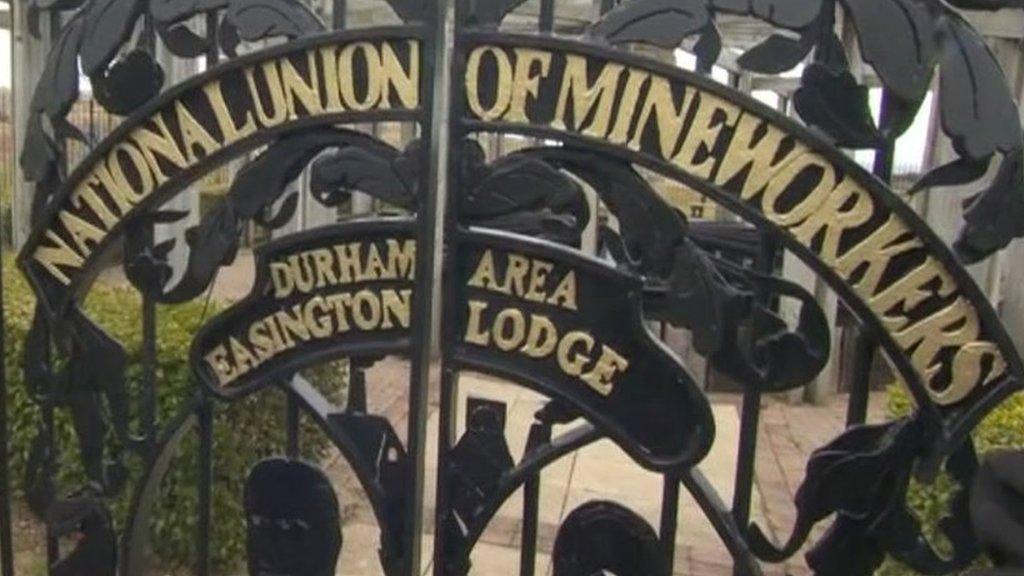
- Published8 April 2013
